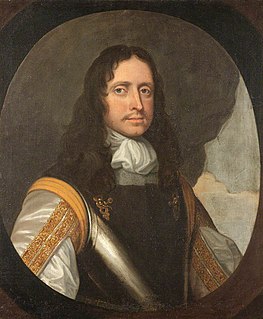Related Research Articles

The Short Parliament was a Parliament of England that was summoned by King Charles I of England on the 20th of February 1640 and sat from 13th of April to the 5th of May 1640. It was so called because of its short life of only three weeks.

Lord Fairfax of Cameron is a title in the Peerage of Scotland. Despite holding a Scottish peerage, the Lords Fairfax of Cameron are members of an ancient Yorkshire family, of which the Fairfax baronets of The Holmes are members of another branch. From 1515 to about 1700 the family lived at Denton Hall.

John Williams was a Welsh clergyman and political advisor to King James I. He served as Bishop of Lincoln 1621–1641, Lord Keeper of the Great Seal 1621–1625, and Archbishop of York 1641–1646. He was the last bishop to serve as lord chancellor.
Sir John Trevor was a Welsh politician who sat in the House of Commons at various times between 1646 and 1672.

Sir Arthur Sackville Trevor Griffith-Boscawen PC was a British politician in the Conservative Party whose career was cut short by losing a string of Parliamentary elections.

Sir John Glynne KS was a Welsh lawyer of the Commonwealth and Restoration periods, who rose to become Lord Chief Justice of the Upper Bench, under Oliver Cromwell. He sat in the House of Commons at various times between 1640 and 1660.

John White was a Welsh lawyer and politician who sat in the House of Commons from 1640 to 1645. His work The first Century of Scandalous Malignant Priests (1643) earned him the nickname "Century White".
Sir John Trevor (1596–1673) was a Puritan Welsh landowner and politician who sat in the House of Commons at various times between 1621 and 1659. He supported the Parliamentarian cause in the English Civil War and was a member of the Council of State during the Commonwealth.

Sir Benjamin Rudyerd or Rudyard was an English poet and politician who sat in the House of Commons at various times between 1621 and 1648. He was also a colonial investor who was one of the incorporators of the Providence Company in 1630. He was a moderate supporter of the Parliamentary cause in the English Civil War.
Henry Pelham was an English lawyer and politician who sat in the House of Commons between 1621 and 1648. He was Speaker of the English House of Commons for a short time in 1647.

Sir John Glanville the younger, was an English politician who sat in the House of Commons at various times between 1614 and 1644. He was Speaker of the English House of Commons during the Short Parliament. He supported the Royalist cause in the English Civil War.
Sir Thomas Trevor, 1st Baronet was a Welsh politician who sat in the House of Commons of England variously between 1640 and 1648.

Sir Thomas Hanmer, 2nd Baronet (1612–1678) was an English politician who sat in the House of Commons in 1640 and from 1669 to 1678. He was a Royalist during the English Civil War and raised troops for Charles I. In his personal life, he was a keen horticulturist. He is not to be confused with Sir Thomas Hanmer, 2nd Baronet (1747–1828) of the second creation, nor with his grandson, Sir Thomas Hanmer, 4th Baronet.
John Bodvel was a Welsh politician who sat in the House of Commons of England from 1640 to 1644. He was a colonel in the Royalist army in the English Civil War.
Thomas Glynn was a Welsh politician who sat in the House of Commons variously between 1624 and 1640. He supported the Parliamentary side in the English Civil War.

Sir Thomas Myddelton, 1st Baronet was a Welsh politician who sat in the House of Commons variously between 1646 and 1663. He supported the Parliamentary cause in the English Civil War but later took part in the Cheshire Uprising (1659) in support of the Restoration.
Charles Jones was a Welsh lawyer and politician who sat in the House of Commons at various times between 1624 and 1640.
Richard Jones was a Welsh politician who sat in the House of Commons between 1628 and 1640. He supported the Royalist cause in the English Civil War.
John Griffith was a Welsh politician who sat in the House of Commons at various times between 1621 and 1642.
Sir Charles Williams (1591–1641) was a Welsh politician who sat in the House of Commons from 1621 to 1622 and from 1640 to 1641.